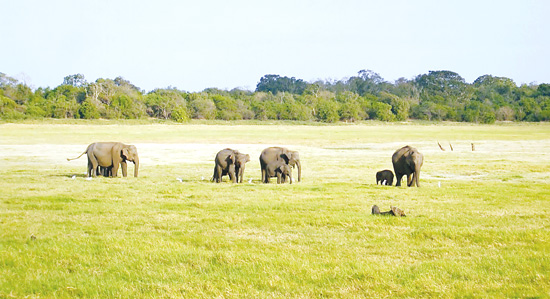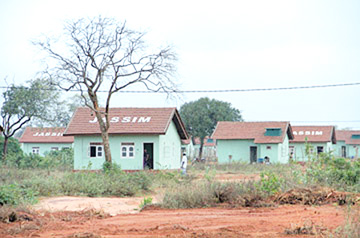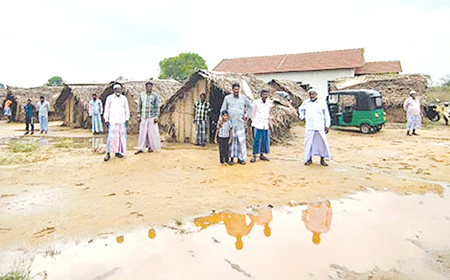Forgetting people and remembering stories?
The poor Muslims of the Mannar
District have the right to be considered as people of Mannar, with a
right to return to their homes from which they were expelled in 1990
several times over. I am not a fan of the victim position but in this
instance it seems especially apt. After the expulsion in 1990 when they
were
summarily driven out from the
North, the LTTE questioned their right to belong to that place, the
right to call it their home. This haunted the Northern Muslims for the
entire 19 years the LTTE was in power. 2009 and the military defeat of
the group lifted this spectre but many others unfortunately have rushed
in to take its place.
by Farzana Haniffa
 |
|
www.miracleisland.wordpress.com |
Muslims-who still claim excellent relations with their Tamil
neighbours in the pre 1990 north-- have long been puzzled as to why the
LTTE drove them out. However, the LTTE's extreme nationalist agenda, the
then government's amateurish attempts to arm young Muslims-and the
possibility of extorting Muslim wealth without any opposition, were
primary causes.The
LTTE's fascist vision did not tolerate any form of difference and
just as they decimated their opposition within the ranks of other Tamil
groups they saw no problem with driving out the Muslims of the north and
looting the considerable wealth that they left behind.
In the political message that the LTTE sent out to the Tamil people,
Muslims no longer belonged in the north. And this message had its
effect.
When Muslims started returning in 2009, many administrative officials
in the north ( but not all., let me be very clear about that) would say
things like why have you come? Aren't you well settled in Puttalam? In
fact some Tamil civil leaders stated that the expulsion was a blessing
in disguise because Muslims didn't have to suffer through the war!!!
(This person has since shifted his position. He told us in 2012 that he
recognises that the Muslims suffered severe economic losses.) The point
of course was that even after the LTTE defeat their politics in Tamil
areas was such that there was little sympathy and a lot of resistance to
Muslim return. Thankfully that has shifted now and the blocking of
administrators is not a story we hear often.
While doing research for an INGO report on northern Muslims in 2012,
one UNHCR field officer and one in Colombo insisted to me that it was
misguided to think in terms of Muslim return to the north. According to
prevailing international norms regarding resettlement and IDPS, people
who have been living in an area for over 20 years should have been
integrated in to that community, that after such a long time it was
"unrealistic" to consider them IDPs, one told me. The other said that
the Vanni(Tamil) IDPs had nothing. The northern Muslims at least had
Puttalam and had a community in Puttalam that they had built up over
several decades that they should ideally stay there.
IDP resettlement
I was told quite categorically that UNHCR would lobby the government
to prioritise Vanni IDP resettlement over all old IDP resettlement.
Perhaps such a position was understandable in a situation of a severe
funding crunch. But what the position meant for northern Muslim
prospects of return was difficult to countenance.
 Of course there were a few facts that were missed by these persons.
Puttalam was already a marginal and poor area with few jobs, very little
land fit for agriculture, no infrastructure to support the large
population that came in 1990,and few improvements since then. Tensions
between displaced and host communities were rife and many Puttalam
people wanted the northerners to leave. Additionally to receive IDP
rations in Puttalam northern Muslims had to maintain their election
registration in the North. Of course there were a few facts that were missed by these persons.
Puttalam was already a marginal and poor area with few jobs, very little
land fit for agriculture, no infrastructure to support the large
population that came in 1990,and few improvements since then. Tensions
between displaced and host communities were rife and many Puttalam
people wanted the northerners to leave. Additionally to receive IDP
rations in Puttalam northern Muslims had to maintain their election
registration in the North.
Under the Sri Lankan provincial councils act, settlements that change
the ethnic composition of an area were suspect. Therefore most northern
Muslims continued to consider the north their home that they would
eventually return to.
Regardless of all this readily available information (many academic
papers had been written on the issues) the INGOs were unaware of much of
the context and insisted that local integration must be considered an
option for all.Now the fact is that some Muslims actually have found
decent lives in Puttalam and many have no intention of returning to the
north. Others chose to live in Puttalam and work in the north. But in
Puttalam the northern Muslims were a population that exceeded 100,000
persons.
Some lived in abject poverty waiting to return to the north. And
another sections of the community lived with a memory of and a desire to
resurrect the prosperous and successful lives that they had in the
north. These stories were invisible and more importantly irrelevant to
the INGO perspective.Through their position, they undermined northern
Muslims legitimate right to return and probably impacted the speed of
the resettlement process.
The BBS of course when it raised its ugly head in 2012 questioned the
entire Sri Lankan Muslim community's right to exist in this country and
not just the Mannar Muslims right to return to the north. The monks of
the BBS framed their position on the issue of Wilpattu not just on
saving a wild life sanctuary but that there should not be an Arab colony
in the area! It was of course in the guise of an environmental issue
that the problem was raised.
Something else
The BBS was clever that way - all the issues that they raised were
done on the basis of something else, not racism. Halal was an unethical
trade practice, the niquab was a security threat and Wilpattu was an
environmental disaster. It is what the issues had in common - that they
targeted Muslim populations -- that remained curious and made one wonder
as to their intentions.
 Today it is clear that the issues that they raised, if they were
indeed issues, did not merit subjecting an entire community to racist
vitriolic, extreme insecurity and the threat of violence. Today it is clear that the issues that they raised, if they were
indeed issues, did not merit subjecting an entire community to racist
vitriolic, extreme insecurity and the threat of violence.
Today, under yahapalana with all that behind us, and where racism has
become boring, there is yet another issue that the Muslims struggling to
return to the North are being forced to confront: the expert knowledge
of the Sri Lankan environmental lobby.
Today the Wilpattu issue is not about "Muslims" as the presenter of
Hiru TV's Balaya segment kept repeating recently, but about saving the
environment. I am responding here to two media encounters with the
environmentalist lobby. One unfortunately, I cannot accurately cite-I
heard it on the radio while driving.
An environmentalist as part of his commentary on the Wilpattu issue
stated also that it was a mono- ethnic settlement that the minister
concerned was establishing there, and that should not be sanctioned. If
there was a settlement being done it should be all ethnicities Muslim
Tamil and Sinhala..
This while being a salutary sentiment smacks of a lack of historical
knowledge. This was not a new settlement. This was an old settlement of
Muslims from several old villages who were driven out by the LTTEand
were returning.
Disputed areas
The second environmentalist intervention I reference is the one on
the aforementioned TV program Balaya, that featured the minister
concerned, a JVP politician, an environmentalist and a University
professor of Geology. In this discussion what was revealed to me was
that the disputed areas that are being known as the Kallaru forest
reserve (no longer the Wilpattu sanctuary) was only gazetted as such in
2012.
The gazetting defined the villages of Karadikuli, Marichchukaddi,
Kondachchi and others as forest! These places where northern Muslims
have been registered as voters for decades-even after 1990-- were
wrongly gazetted as forest.
The environmentalist response to this challenge was to accuse the
minister of lying.
"Why should the government do such a thing, and why, ifthis was
indeed the case, had land-owners not filed cases against the state," he
asked. This was perhaps a fair question. But it was also an indication
of just how little knowledge the environmental lobby had about the
northern Muslims history in the area. There is enough information
available. One set is the electoral registers. Additionally there must
be countless documents with local administrators that attest to
settlements being there prior to 1990. There is also documentation done
in the immediate aftermath of the expulsion by Dr.S.H.Hasbullah.
 The Law and Society trust ran a Citizens' Commission on the expulsion
of Muslims and we worked from 2007 to 2011 collecting stories and
documents. Our report is available and though we did not specifically
emphasise the fact that there were people who lived in the areas
immediately north of Wilpattu, we have enough references - testimonies
of people from Marichchukatti and Kondachchi for instance, that can
serve as information on the existence of these villages. The Law and Society trust ran a Citizens' Commission on the expulsion
of Muslims and we worked from 2007 to 2011 collecting stories and
documents. Our report is available and though we did not specifically
emphasise the fact that there were people who lived in the areas
immediately north of Wilpattu, we have enough references - testimonies
of people from Marichchukatti and Kondachchi for instance, that can
serve as information on the existence of these villages.
Returning Muslims
Another question from the environmentalist: if the returning Muslims
were claiming that they were coming back to the land that they owned
then why was there a need for a land kachcheri? The response was that
the regularization of land ownership through the presenting of deeds
happened in the north in 1995. This was five years after the expulsion.
Therefore, new deeds had to be given and new lands had to be handed
over to the children of the original settlers. This question was an
indication that the environmentalists were also inadequately informed of
the hugely complex problem of land in the aftermath of the conflict and
extensive reports that were produced by different organisations - the
Centre for Policy Alternatives, the Human Rights Commission of Sri Lanka
for instance-on the issue.
Thankfully, the Hiru TV program at least provided a forum for the JVP
representative to acknowledge without question, the right of the
displaced northern Muslims to access land for settlement and for their
children to return as well. And the JVP representative was able to lift
the discussion to a level where he emphasized that there was a necessity
to discuss the environmental impact of all settlement processes in the
north.
For me, however, the environmentalists' lack of knowledge about the
history of Muslims' expulsion, and his complete disregard for the
specifics of that history were troubling. After having spoken with
hundreds of people from there and listened to their stories, the denial
that they ever existed is shocking. And therefore, while an IDP policy
and an Environmental Policy with regards to resettlement are no doubt
needed, we also have to inculcate a regard in one another for our
respective stories of suffering. We have conversations about
reconciliation - sanhindiyawa. These seem to be the moments when the
need for such a sanhindiyawa are paramount. |

